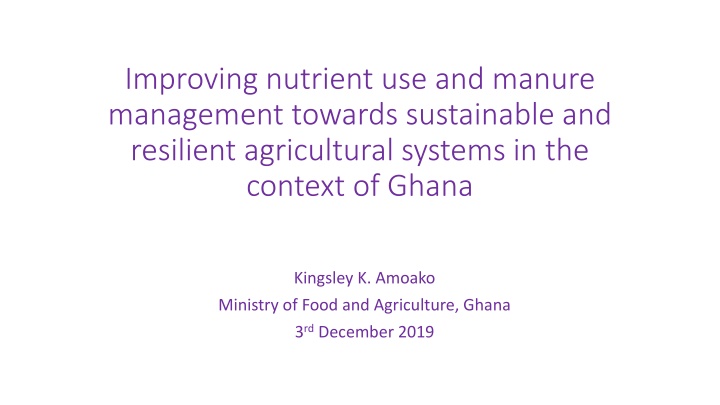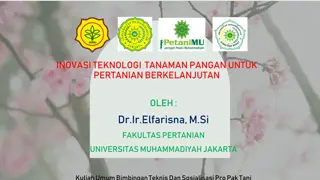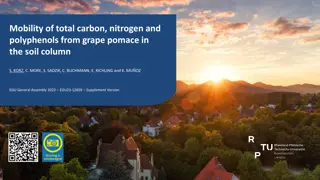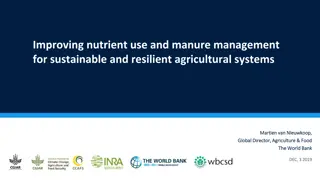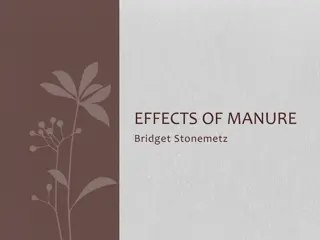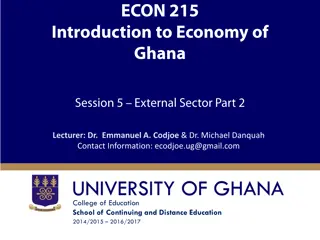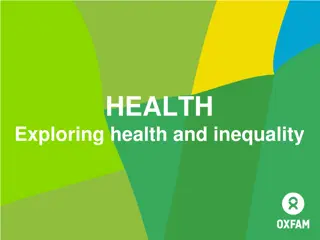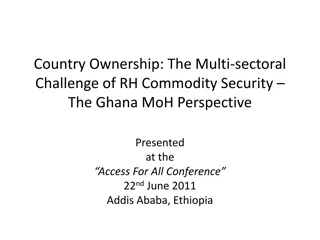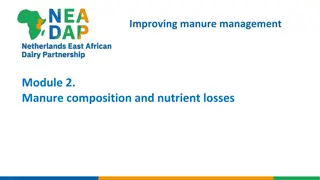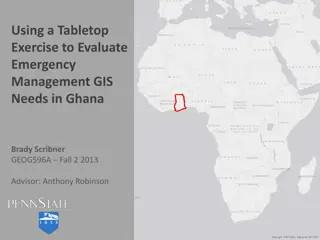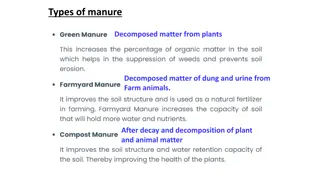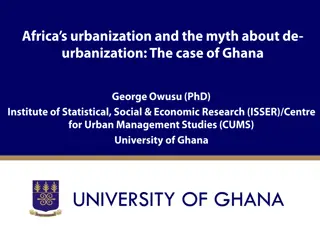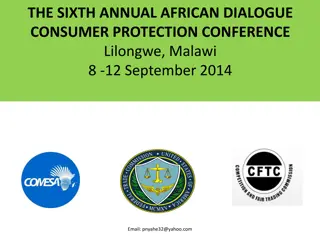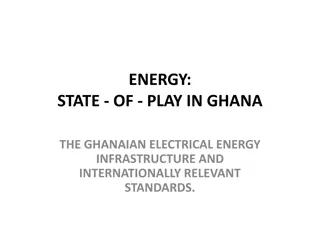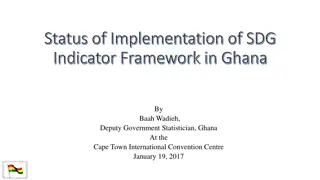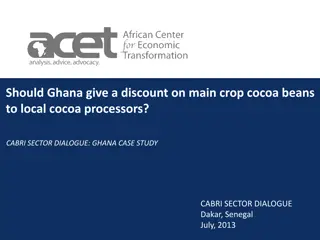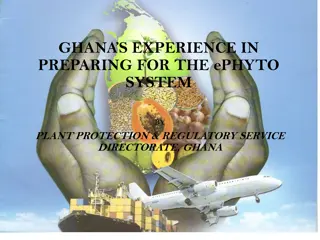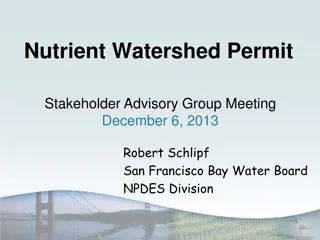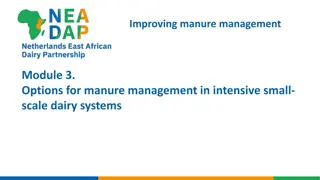Enhancing Nutrient Use and Manure Management for Sustainable Agriculture in Ghana
This study explores strategies to improve nutrient utilization and manure management in Ghana's agricultural systems. It discusses the sources of soil nutrients, reasons for low fertilizer use in Africa, ambitious targets set by the AU, and the impact of fertilizer subsidy programs in Ghana. Data on fertilizer imports, crop productivity under subsidy programs, and the challenges faced in achieving optimal fertilizer utilization are also highlighted.
Download Presentation

Please find below an Image/Link to download the presentation.
The content on the website is provided AS IS for your information and personal use only. It may not be sold, licensed, or shared on other websites without obtaining consent from the author.If you encounter any issues during the download, it is possible that the publisher has removed the file from their server.
You are allowed to download the files provided on this website for personal or commercial use, subject to the condition that they are used lawfully. All files are the property of their respective owners.
The content on the website is provided AS IS for your information and personal use only. It may not be sold, licensed, or shared on other websites without obtaining consent from the author.
E N D
Presentation Transcript
Improving nutrient use and manure management towards sustainable and resilient agricultural systems in the context of Ghana Kingsley K. Amoako Ministry of Food and Agriculture, Ghana 3rdDecember 2019
Sources of soil nutrients and manure in Africa Organic sources: Cattle manure Poultry manure Crop residue Inorganic sources: Synthetic fertilizers
Fertilize use in selected regions
Reasons for low use of fertilizers in Africa Sub-Saharan Africa is the World s Most Expensive Fertilizer Market A 2011 study found that fertilizer costs in sub-Saharan Africa were at least four times more expensive than they were in Europe. High transportation cost Ocean shipping Inland trucking and rail cost Fertilizer production on the continent is low and difficult due to; High cost of raw materials High production energy requirement
Africas ambitious targets for nutrient use AU Abuja declaration in 2006 encouraged the African Union Member States to increase the level of fertilizer use from average of 8 kilograms per hectare by then to an average of 50 kilograms per hectare by 2015. This target has not been achieved. Currently, fertilizer use in Africa is approximately 16 kg/ha compared with over 100 kg/ha for other regions In response to the Abuja declaration, the Government of Ghana introduced fertilizer subsidy programme since 2009 to improve fertilizer use and food productivity. This enabled fertilizer use to increase from an average of 7.4kg/ha by then to 20.9kg/ha in 2016.
10 year Imported inorganic fertilizers Fertilizer Imports 300,000 250,000 200,000 150,000 100,000 50,000 0 2007 2008 2009 2010 2011 2012 2013 2014 2015 2016 NPK (Mt) Urea (Mt) SoA (Mt)
National average productivity of selected crops under seed and fertilizer subsidy programme - Ghana Average Yield response to seed and fertilizer subsidy programme Crop productivity targets Sorghum Crop Yield target Mt/ha Soybean Sorghum 2 Soybean 3 Rice Rice (Paddy) 6 Maize Maize 5.5 0 0.5 1 1.5 2 2.5 3 3.5 4 4.5 2018 (Yield MT/HA) 2017 (Yield MT/HA) 2016 (Baseline Yield MT/HA) Data source: MoFA, PFJ 2019
Manure production and use in West Africa
Challenges with manure use in Africa Exposure to high temperatures leading to loss of nutrients Fire
Nutrient for improved soil health and crop productivity Manure is the main input of carbon into the soil Use of manure restores productivity of degraded soils Mineral fertilizer alone could not restore productivity of degraded soils 3 yr Ave. Maize MT/ha 4.00 3.00 2.00 1.00 0.00 Control T1 T2 25 2 yr Ave. Cassava MT/ha 20 15 10 5 T1- residue left +4t/ha Poultry manure (approx.:100-50-64NPKkg/ha) T2- residue left + 4t/ha Poultry manure +low NPK (30-20-20NPK kg/ha) (Quansah et al., 1998a) 0 Control T1 T2
Integrated plant nutrient management 2014: Maize yield response to NPK (90-60-60), Poultry Manure (3MT/ha) and 50% rate of NPK+PM: Trial of Soil nutrient amendment on maize yield 1400 1200 1000 800 600 400 200 0 Control 100% NPK 100% PM 50% (NPK+PM) S1 kg/ha S2 kg/ha Source: Department of Crop and Soil Sciences, KNUST, Kumasi, Ghana
Key Messages Low use of fertilizer in Ghana and Africa is mainly due to high cost. To increase nutrient use, the costs of fertilizers, among other factors, needs to come down substantially Numerous research has demonstrated that integrated use of fertilizer and manure is key for increased crop yields and minimizing land degradation and GHG mitigation Support scale of improved soil health and productivity good practices and proven technologies in Ghana, To increase fertilizer use to the levels of aspired to by the Abuja Declaration, there will have to be a meaningful increase in regional production and lower transportation costs
